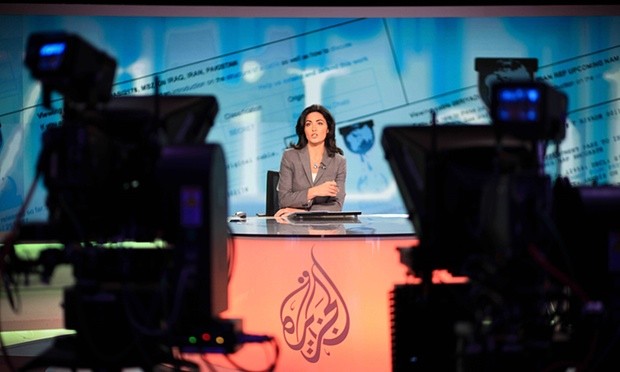Al Jazeera”s fortune has fallen, but how can it be fixed?

Exactly five years ago, the world was captivated by the sight of millions of Egyptians ousting a tyrant after decades of ironfisted rule.
The world watched all this through acclaimed and garlanded coverage on al-Jazeera, in what was billed as a “breakthrough” moment for the network worldwide. The protesters in Tahrir Square watched themselves on the network’s Arabic service, erecting impromptu cinema screens using sheets of white cloth.
Al-Jazeera was the first outlet in the region that crossed borders, told the stories of ordinary people, and asked awkward questions of its rulers. The attitude made it a broadcasting phenomenon and, despite the later appearance of many competitors, the region’s most-watched news channel.
The network’s management had differing approaches to the revolution. Some of the old-fashioned news hacks said their job was simply to cover the events, not to encourage them.
It may be though, as Orwell said, that telling the truth in a time of universal deceit was a revolutionary act. Others, such as the director general at the time, Wadah Khanfar, took to TED to declare “the [democratic] future we were dreaming of has arrived”.
Fast forward five years, and the revolutions have been in crisis for quite some time. Al-Jazeera’s fortunes, which rose with it, have fallen too. The future arrived but wasn’t what we had dreamed of during the initial euphoria of the overthrows.
Al-Jazeera has been blamed in many quarters of the Middle East for the carnage and chaos that has followed. Those critics do not see instability as the inevitable bitter harvest of tyranny. They think dictators can rule forever and that the dreams and spirit we saw in 2011 can somehow be permanently subdued – if everyone simply accepted corruption and despotism, everything would be fine.
Al-Jazeera’s response to the revolutionary rollback has been inadequate. Some of it is to be expected. The quagmires in Syria, Egypt and other countries have become very personal for their diasporas who make up much of the staff base at al-Jazeera. They live every killing, every jailing and every injustice.
This has manifested itself in coverage which is deemed partisan along narrow lines, and more motivated by the settling of old scores, rather than lighting torches of freedom and progress.
This matters because the revolutions have suffered setbacks in large part because of a failure to plan. If there is to be a next stage to the revolution, it has to be well thought out. However, even the network’s annual forum, designed to bring together political players in the region, isn’t being utilised to map out the future in detail. There are precious few progressive institutions in the Arab world and that makes the region’s most influential media organisation even more important.
Recently, though, cuts by the Qatari state have been causing panic at the network.
Aside from the decline in oil prices, there is real speculation that the state is reducing its backing because of all the “problems” al-Jazeera has caused with its neighbours. One recent news report claimed the network had blocked an article due to pressure from Saudi Arabia.
Al-Jazeera America is being shuttered after only two years and over $2bn of investment. Staff at al-Jazeera English have been frustrated that the real prospect that existed of overhauling CNN and BBC World has been on pause for 18 months, with not even talented departed staff being replaced. Meanwhile, the network is not making the case for why it should continue to be supported.
The BBC’s director general, Tony Hall, recently attempted to justify his organisation’s funding by making the appeal that it fosters democracy and therefore needs to not only continue its Arabic, Farsi, Russian and other services, but also wants to expand into North Korea. Some may debate the effect of such outreach, but al-Jazeera is the real indigenous deal when it comes to being a force for democracy in the Middle East. The world should care about this because greater freedoms and hope in the future will stop the rise of extremist groups like Daesh [Islamic State].
Al-Jazeera is, however, a shadow of what it was under charismatic idealist Khanfar. It has stopped articulating a greater purpose, stopped setting the agenda, and stopped appearing to have its finger on the pulse. The endless stream of high-profile visitors to the network’s HQ attempting to get a handle on what’s going on in the Middle East have stopped coming. No one even seems to care or question why the network has had a temporary director general, Mostefa Souag, for nearly three years now, or how it can function for so long in the absence of empowered leadership.
There is a lot at stake and a lot to do. Al-Jazeera has to make a better fist of the situation, stop living solely in the past, and begin exciting the world again with its passion and ideas. In an albeit shallow pool, it is still the Arab world’s most progressive institution and best hope. It must realise this mantle and better exercise its power. Once it does, it will find the people rallying to its side once more.
Osama Saeed was al-Jazeera’s global head of communications between January 2011 and January 2016.
How to submit an Op-Ed: Libyan Express accepts opinion articles on a wide range of topics. Submissions may be sent to oped@libyanexpress.com. Please include ‘Op-Ed’ in the subject line.
- Libya’s HCS invites applicants for key state roles - December 31, 2023
- UK calls on Iran to prevent escalation in Israel-Hamas conflict - November 05, 2023
- Libyan Interior Minister: Immigrant shelter costs a fortune - November 05, 2023


